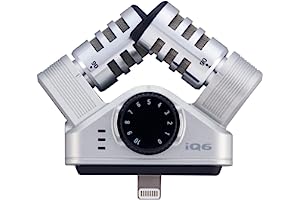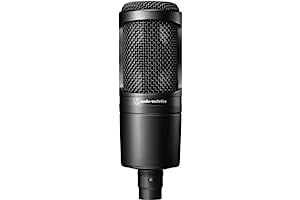Features
Zoom iQ6

- The same condenser microphones as the world-famous H4n
- Adjustable microphone angles from 90 to 120 degrees
- Able to be used both on phones with cases and without
Audio-Technica AT2020

- High sound pressure level and outstanding dynamic range make it a particularly versatile microphone
- Made to measure 16mm low-mass diaphragm, providing both wide frequency response and superior transient response
- Cardioid polar pattern improves isolation of desired sound source and a reduction of sound to the side and rear
- Screw fixture and swivel foot ensure secure mounting and facilitate accurate microphone positioning.Compatible with Windows 7 Vista XP 2000 and Mac OS X
Zoom iQ6 iOS Lightning X/Y Microphone vs Audio-Technica AT2020 Cardioid Condenser Studio XLR Microphone
Aspiring musicians, podcasters, and audio engineers may have a difficult time choosing the right microphone for their needs. Do you choose a microphone with a Lightning connection for iOS devices, or one with an XLR connection? This blog post will compare the Zoom iQ6 iOS Lightning X/Y Microphone and the Audio-Technica AT2020 Cardioid Condenser Studio XLR Microphone, helping you make an informed decision.
Compatibility
The Zoom iQ6 iOS Lightning X/Y Microphone is designed to be used with iOS devices, such as iPhones and iPads. It features a Lightning connector, so you won’t need an additional adapter to use it with your device. On the other hand, the Audio-Technica AT2020 Cardioid Condenser Studio XLR Microphone requires an XLR connection, which is not compatible with iOS devices. This makes the Zoom iQ6 a more convenient choice for iOS users.
Sound Quality
The Zoom iQ6 iOS Lightning X/Y Microphone is equipped with two high-quality condenser capsules, providing a natural and detailed sound. It has a frequency range of 20 Hz to 20 kHz, making it suitable for recording a wide variety of instruments and vocals. The Audio-Technica AT2020 Cardioid Condenser Studio XLR Microphone also has two condenser capsules, with a frequency range of 20 Hz to 20 kHz. Both microphones have a cardioid polar pattern, which reduces noise from the sides and rear.
Durability
The Zoom iQ6 iOS Lightning X/Y Microphone is built with a rugged aluminum body, making it durable and reliable. Its internal components are also protected from dust and moisture. The Audio-Technica AT2020 Cardioid Condenser Studio XLR Microphone is made of a combination of metal and plastic, making it robust and resistant to wear and tear.
Price
The Zoom iQ6 iOS Lightning X/Y Microphone is more affordable than the Audio-Technica AT2020 Cardioid Condenser Studio XLR Microphone. This makes it a great option for those on a tight budget.
Conclusion
The Zoom iQ6 iOS Lightning X/Y Microphone and the Audio-Technica AT2020 Cardioid Condenser Studio XLR Microphone are both great options for aspiring audio engineers and musicians. The Zoom iQ6 is more compatible with iOS devices and is more affordable, while the Audio-Technica AT2020 offers superior sound quality and durability. Ultimately, the choice is up to you and your specific needs.
For more information, check out the official websites of the Zoom iQ6 iOS Lightning X/Y Microphone here and the Audio-Technica AT2020 Cardioid Condenser Studio XLR Microphone here.
Specifications / Attributes
| Feature | Zoom iQ6 | Audio-Technica AT2020 |
|---|---|---|
| Colour | Multicolor | Black |
| Colour Screen | N/A | No |
| Compatible Devices | Phones | Any Recording Programs, Audio Interface |
| Connector | Lightning | XLR Connector |
| Date First Available | 28 June 2018 | 13 March 2018 |
| Hardware Platform | Tablet, Smartphone | PC |
| Item Model Number | iQ6 | AT2020 |
| Item Weight | 136 g | 600 g |
| Material Type | N/A | Metal |
| Musical Style | N/A | Any Genre |
| Power Source | Corded Electric | Corded Electric |
| Product dimensions | 23.11 x 5.59 x 11.43 cm; 136.08 Grams | 24.38 x 24.38 x 6.6 cm; 600 Grams |
| Size | N/A | 0 |
| Supported Software | N/A | Cubase, ProTools, GarageBand |
| Voltage | N/A | 240 Volts |
| Check the Best Deal Price Today | Check the Best Deal Price Today |







